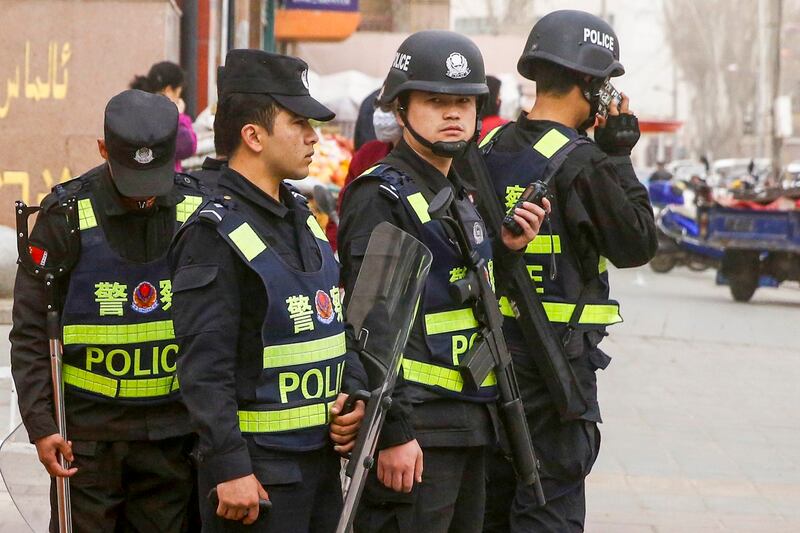A 29-year-old Uyghur woman died of a suspected heart attack after collapsing in tears over the corpse of her jailed husband – and then being interrogated by police in China’s northwestern Xinjiang region, a source with knowledge of the situation told Radio Free Asia.
A police officer who confirmed the death of Nurimangul Hashim suggested she may have died after being dealt a fatal blow by another policeman, not a heart attack.
The accounts provide a glimpse of the suffering endured by the mostly Muslim Uyghurs, some 1.8 million of whom have been herded into concentration camps set up by China across Xinjiang, purportedly to counter religious extremism and terrorism.
Hashim’s husband, Memettursun Imin, 32, died in prison while serving a sentence for getting around China’s “Great Firewall” of internet censorship and visiting foreign websites. The circumstance of his death were unclear.
When four officials brought Hashim his body, she broke down in tears and accused them of being murderers, said the source who hails from the same village of Xaneriq in Kashgar Yengisheher county of Kashgar prefecture. The person insisted on not being identified for security reasons.
After Imin was buried, police took Hashim to the county police station for interrogation, and soon after that she died of a heart attack, the person said.
Police confirm deaths
A local police officer contacted by Radio Free Asia – a major accomplishment in itself – was able to confirm both Hashim's and Imin’s deaths, but said that Hashim lost consciousness during interrogation and died before reaching the hospital.
“I heard she might have been struck with a police baton or punched,” he told RFA, raising speculation that police sought to cover up her real cause of death by saying she had a heart attack.
“Others told me that she threw herself on top of her husband's body and cried,” he added, saying he was not there when the incident occurred.

Imin, the husband, was one of six Uyghur prisoners from Xaneriq village whose body was released to family members after he died in prison, area police told RFA Uyghur.
Authorities detained about 120 people from the village’s Tawaqchi community when mass arrests of Uyghurs and members of other Muslim groups began in Xinjiang in 2017.
RFA earlier reported on the release of another inmate, Mahmudjan Muqeddem, 46, the only villager to be freed alive from prison. Authorities said he had served a seven-year sentence for advising friends not to drink alcohol, which is prohibited under Islam.
A second police officer with knowledge of the situation told RFA Uyghur the names of the four of the other residents who died while in jail: Yusuf Musa, Memet Imin, Memet Abdulla and Hashim Qurban – Nurimangul Hashim’s father.
A third police officer who works in Xaneriq confirmed the names of the men, adding Tursun Abdukerim to the list.
The officer said he and others have been “conducting ideological work with the families of the deceased to help calm them down” by visiting them daily.
However, Uyghurs understand that the main purpose behind this monitoring by local law enforcement officers is to prevent rumors about the deaths from spreading within their communities.
Whenever a body is released from prison, authorities remind residents of notices advising them not to accept calls from outside the area and to avoid spreading gossip, said the Uyghur from Xaneriq who declined to be identified.
Hashim’s family
One of the police officers also confirmed that Nurimangul Hashim’s parents had been arrested on suspicion of “religious extremism.”
Authorities often detained elderly residents of Tawaqchi village for listening to religious readings at events like gatherings, weddings and funerals, the policeman said.
They arrested and sentenced young Uyghurs because of “problems” related to their mobile phones, he added.
Hashim's mother, Gulqiz Helihem, refused to accept money from the government given to low-income families, stating it was haram, an Arabic term meaning forbidden by Islamic law, the officer said.
“She also declined salt distributed to farmers, for the same reason,” he said. “Their family had those beliefs, and [Nurimangul Hashim] was the daughter of such a family.”
Hashim's father died in prison three years ago, while her mother remains in prison, he said.
Translated by RFA Uyghur. Edited by Roseanne Gerin and Malcolm Foster.
